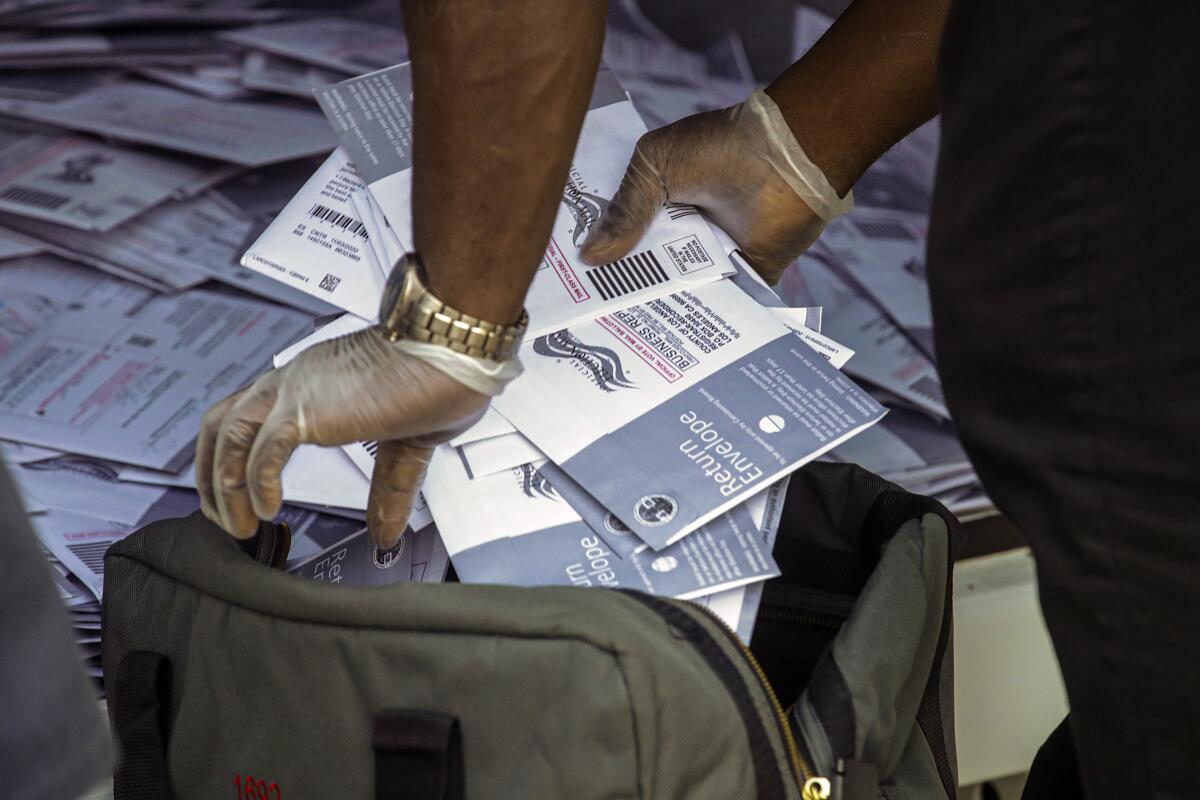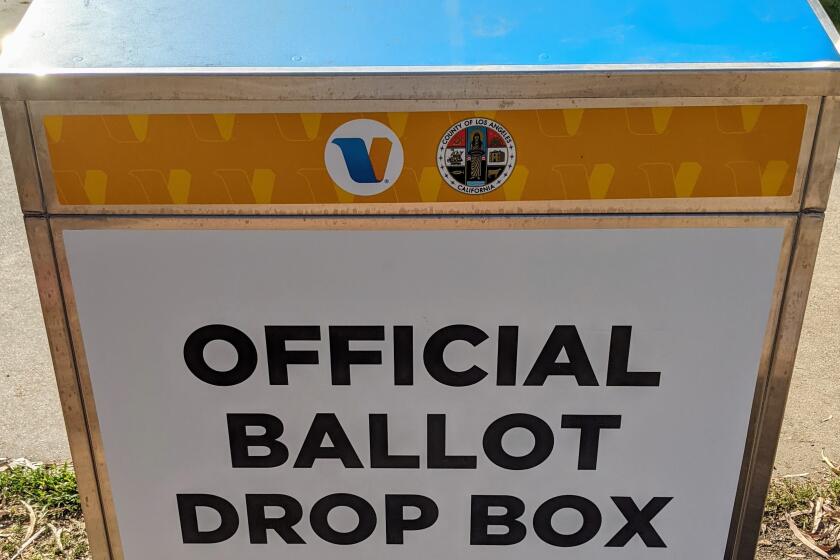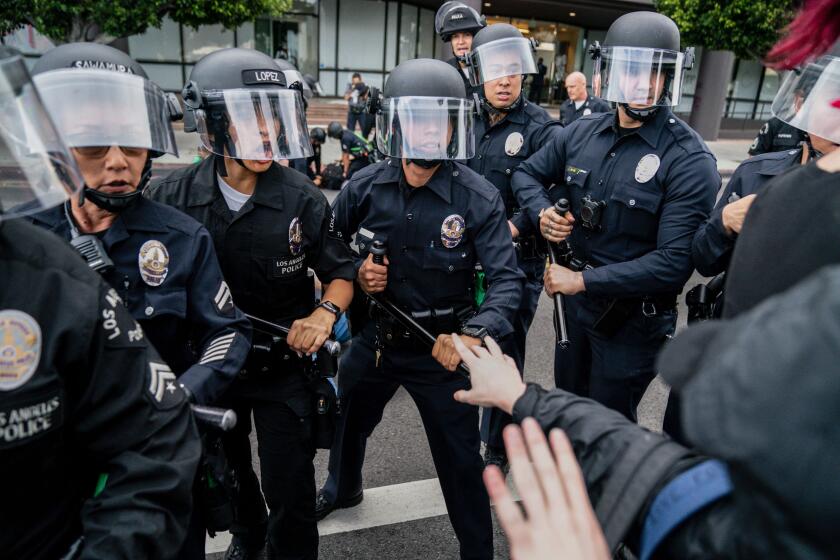Op-Ed: Voters wanted big change from Measure J. Why hasn’t L.A. seen it yet?

More than 2 million voters cast ballots in November 2020 to provide historic support for Measure J — an innovative measure to dedicate at least 10% of Los Angeles County’s locally generated unrestricted funding toward community investments such as youth and small business development, job training, housing services and alternatives to incarceration, with the goal to reduce the impact of racial and economic injustice.
It is now 2022. What has happened since then?
In short, not much for the communities the measure was meant to serve.
Measure J was ruled unconstitutional, but the county can still spend 10% of its budget on social services and jail diversion programs.
Measure J faced a setback last July when L.A. Superior Court Judge Mary Strobel ruled it to be unconstitutional, declaring that putting the issue to voters undermined the L.A. County Board of Supervisors’ authority to set its budget. With the popular measure on hold, the board voted in August to put 10% of unrestricted county-generated revenue toward community programs, comparable on paper to the original commitment.
But the long delay in confirming the full investment shows a lack of political will and follow-through from the county to provide the services Los Angeles needs.
Advocates estimated that a 10% allocation toward Measure J would initially generate at least $330 million per year, totaling nearly $1 billion in full set-aside funding by June 2024. However, the county CEO’s office estimates that only $300 million of unrestricted funds will go toward Measure J by 2024. The supervisors approved a $187.7-million spending package for the first year, with just $100 million of that coming from the county’s unrestricted funds (the other $87.7 million comes from federal American Rescue Plan funding). That falls short of the investments we need to address the most pressing issues facing L.A. County and undermines the wishes of voters who demanded a bolder budget.
Contrast this underinvestment with the whopping $3.5 billion allocated to the Los Angeles County Sheriff’s Department annually. This current budget reflects and reinforces a status quo that fuels the over-incarceration and criminalization of Black, Latinx and other communities of color.
L.A. County operates the largest jail system in the nation, and one-third of the jail population was receiving some kind of mental health treatment as of 2019. Instead of pouring more funding into law enforcement systems that expect prisons and jails to provide mental health and other support services to communities while criminalizing them, we can fund evidence-backed solutions including diversion and prevention programs, community-based pretrial services and restorative justice.
While the supervisors’ budget puts some money toward such community programs, other programs recommended by the Measure J Re-imagine L.A. Advisory Committee — which aimed to give voice to community needs — were ignored.
After George Floyd, many Americans backed police reform. Now with a rise in crime, activists must fight changing opinion by politicians and the public.
Where the committee recommended $3 million for community-based intervention services and prevention programs for youth, for example, the county allocated nothing. Crucial investments in projects including the construction of community-based hubs; short- and long- term housing; and others that would alleviate food insecurity, provide safe and affordable shelter and offer direct behavioral, mental and physical care — including harm reduction services — have fallen short of the advisory board’s recommendations. This severely reduces the plan’s effectiveness.
These final budget decisions for this first year of community investment were ultimately up to the county chief executive officer, and we have yet to see a thoughtful community engagement plan for future years of this funding.
Meanwhile, the same communities Measure J was meant to serve have borne the brunt of COVID-19’s devastation. The pandemic and its economic fallout have exacerbated issues such as rising costs of living, unaffordable housing and stagnant wages that have made much of Los Angeles nearly uninhabitable for many.
We are experiencing too much lag time since the historic 2020 vote for Measure J, when 57% of voters clearly stated their budget priorities. Los Angeles residents are still waiting to see the original vision of the measure fulfilled.
With a push from organizers, community members and advocates, L.A. County has made tremendous headway on criminal justice reform in the past few years, beyond Measure J: the cancellation of a nearly $2-billion jail expansion plan, progress in closing the Men’s Central Jail and the passage of Measure R that granted the Sheriff Civilian Oversight Commission greater authority in reducing the jail population and incarceration, as well as subpoena power to investigate complaints related to the sheriff’s office.
We must continue that work to reimagine L.A. now. We need the Board of Supervisors to honor the wishes of more than 2 million voters and immediately put more money toward much-needed services.
Megan Castillo is the coordinator for the Reimagine LA Coalition. Bamby Salcedo is president and CEO of the TransLatinaCoalition.
More to Read
A cure for the common opinion
Get thought-provoking perspectives with our weekly newsletter.
You may occasionally receive promotional content from the Los Angeles Times.












